Dharma Prabhu

Plot
Dharma Prabhu is a 1999 Indian Kannada-language drama film directed by V. Somashekhar, starring Shiva Rajkumar and Radhika. The movie is a thought-provoking exploration of justice, morality, and the consequences of one's actions. The story begins with Lord Shiva, often referred to as the destroyer, witnessing a heart-wrenching scene in which a young girl named Radhika is struggling to breathe, on the verge of death. The girl's desperate plea to live resonates deeply within Lord Shiva, and with an impulsive act, he halts the inevitable fate of the girl by saving her life. However, this act of intervention angers Lord Yama, the god of death, as it contradicts the natural order of things. As Lord Yama sees it, his duties include not only taking lives but also protecting the natural equilibrium of the universe by ensuring that justice is upheld. By saving the young girl, Lord Shiva has circumvented the law of karma, and thus, Lord Yama's duties are compromised. The situation escalates, and Lord Shiva accuses Lord Yama for failing to perform his duties in saving the life of the girl, who is later revealed to be a notorious criminal-politician. The girl, a symbol of the corrupt and morally bankrupt system in society, represents a significant challenge to the existing social hierarchy. As Lord Yama is accused, the god is given a rare opportunity to rectify his past mistake and save his reputation by proving that justice was upheld in the case of the young girl. Lord Yama receives a temporary reprieve by Shiva, who gives him a few days to prove himself. This reprieve provides the backdrop for the story, where Lord Yama has to navigate the complexities of the human world and ensure that justice is served. The narrative is a journey of Lord Yama as he grapples with the consequences of his actions and finds ways to rectify them. Through a series of events, Yama discovers that Yamaraj's law, which dictates that every life has a designated time to end, was not just a cold, heartless mechanism but also served the greater good of maintaining equilibrium in the universe. As Yama navigates the human world, he becomes increasingly disillusioned with the societal norms and the way justice is meted out. Yama encounters a group of people who believe in upholding the law and are not corrupted by the system. They form the core of Yama's support system, helping him understand the intricacies of the human world. However, they are also the ones who are threatened by the actions of the powerful people in authority, exemplified by the politician that Yama had been tasked to bring justice for. Throughout his journey, Yama's perceptions change dramatically. While initially he viewed his role as merely taking lives, he comes to understand the intricacies of justice and the impact of his actions on individuals and society. Yama is faced with a dilemma where he must balance the demands of the universe against the needs of the individual, reflecting the complexity of real-world justice. As Yama strives to prove himself, the story becomes a commentary on the societal ills of corruption, injustice, and power abuse. The character of the politician, a symbol of the corrupt system, highlights the moral decay of society. The young girl, now revealed to be part of this corrupt system, is a reflection of the impact of such actions on individuals and society. In the end, Yama successfully rectifies his actions and ensures that justice is served, saving his reputation and fulfilling his duties as the god of death. The story concludes on a hopeful note, with Yama emerging as a more compassionate and empathetic god, who recognizes the complexities of the human world. The film Dharma Prabhu, through its narrative and characters, offers a unique perspective on justice, morality, and the nature of existence. It raises intriguing questions about the consequences of our actions and the importance of maintaining balance in the universe.
Reviews
Recommendations





